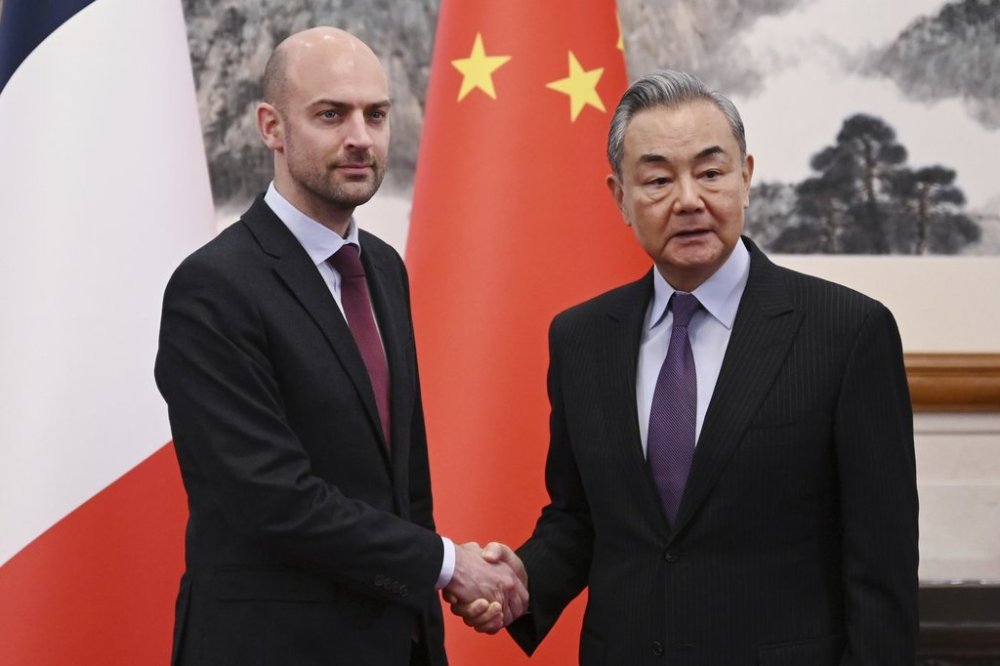France’s foreign minister is in China to discuss Ukraine and trade issues
Advertisement
Read this article for free:
or
Already have an account? Log in here »
To continue reading, please subscribe:
Monthly Digital Subscription
$0 for the first 4 weeks*
- Enjoy unlimited reading on winnipegfreepress.com
- Read the E-Edition, our digital replica newspaper
- Access News Break, our award-winning app
- Play interactive puzzles
*No charge for 4 weeks then price increases to the regular rate of $19.95 plus GST every four weeks. Offer available to new and qualified returning subscribers only. Cancel any time.
Monthly Digital Subscription
$4.99/week*
- Enjoy unlimited reading on winnipegfreepress.com
- Read the E-Edition, our digital replica newspaper
- Access News Break, our award-winning app
- Play interactive puzzles
*Billed as $19.95 plus GST every four weeks. Cancel any time.
To continue reading, please subscribe:
Add Free Press access to your Brandon Sun subscription for only an additional
$1 for the first 4 weeks*
*Your next subscription payment will increase by $1.00 and you will be charged $16.99 plus GST for four weeks. After four weeks, your payment will increase to $23.99 plus GST every four weeks.
Read unlimited articles for free today:
or
Already have an account? Log in here »
Hey there, time traveller!
This article was published 26/03/2025 (288 days ago), so information in it may no longer be current.
BEIJING (AP) — French Foreign Minister Jean-Noël Barrot began a two-day visit to China on Thursday and held talks with his Chinese counterpart on Ukraine and longstanding trade disputes between China and Europe.
There was no word of any immediate progress, but both sides sounded positive on the state of relations.
Barrot met with Chinese Foreign Minister Wang Yi, who said in a news conference afterward that both countries should “choose multilateralism over unilateralism … and pursue mutual benefit and win-win outcomes instead of decoupling and isolation.”

That echoed language frequently used by China in criticizing U.S. foreign policy and the Western-led political order.
Barrot later met with Premier Li Qiang, who said: “As we all know, the world is currently not peaceful, and instability and uncertainty are increasing.”
“As two independent and responsible major countries, China and France should strengthen cooperation. Through our cooperation, we should inject more certainty into bilateral relations and the world,” Li said.
Barrot responded that the world was “indeed going through troubled times where a number of major principles, particularly those of multilateralism, are being shaken.”
“In this context, a new Europe is rapidly emerging, its only compass being strategic autonomy. This new Europe is investing massively in its defense, in energy,” the minister said before reporters were escorted from the room.
On Friday, Barrot will travel to Shanghai for meetings with local officials and business leaders.
France has been a staunch supporter of Ukraine in its struggle against Russia’s invasion, while Beijing has backed Russia diplomatically and provided an economic lifeline by buying Russian natural resources. Barrot’s visit is an opportunity to gauge China’s attitude on Ukraine ahead of a major French-hosted meeting on a possible peacekeeping force for the country.
The talks come as fissures are showing between the U.S. and Europe over support for Ukraine, with Washington increasingly seen as backing Moscow.
French President François Macron said Wednesday that a proposed European armed force could be deployed in Ukraine in under an eventual peace deal, and could “respond” to a Russian attack if Moscow launched one.
Europe has long complained of unfair Chinese trade practices that it says force European companies to take on Chinese partners, share business practices and result in a major Chinese trade surpluses.
The sides also issued a joint statement reaffirming cooperation on climate change marking the 10th anniversary of the Paris Agreement, saying “the agreement and its long-term goals even more requires all parties to inject political impetus into the international cooperation on jointly fighting climate change (and) protecting biodiversity and ecosystems.”
China is both the largest producer and consumer of fossil fuels, mainly coal.
The administration of U.S. President Donald Trump has started the one-year process to once again pull out of the 2015 Paris climate agreement and, formalizing another withdrawal from both climate and foreign aid programs, the Trump administration has told world financial institutions that the U.S is pulling out of the international climate Loss and Damage Fund.
In its first 50 days, the Trump administration has eliminated or cut funding for environmental justice domestically, foreign aid, climate change and diversity, equity and inclusion.

